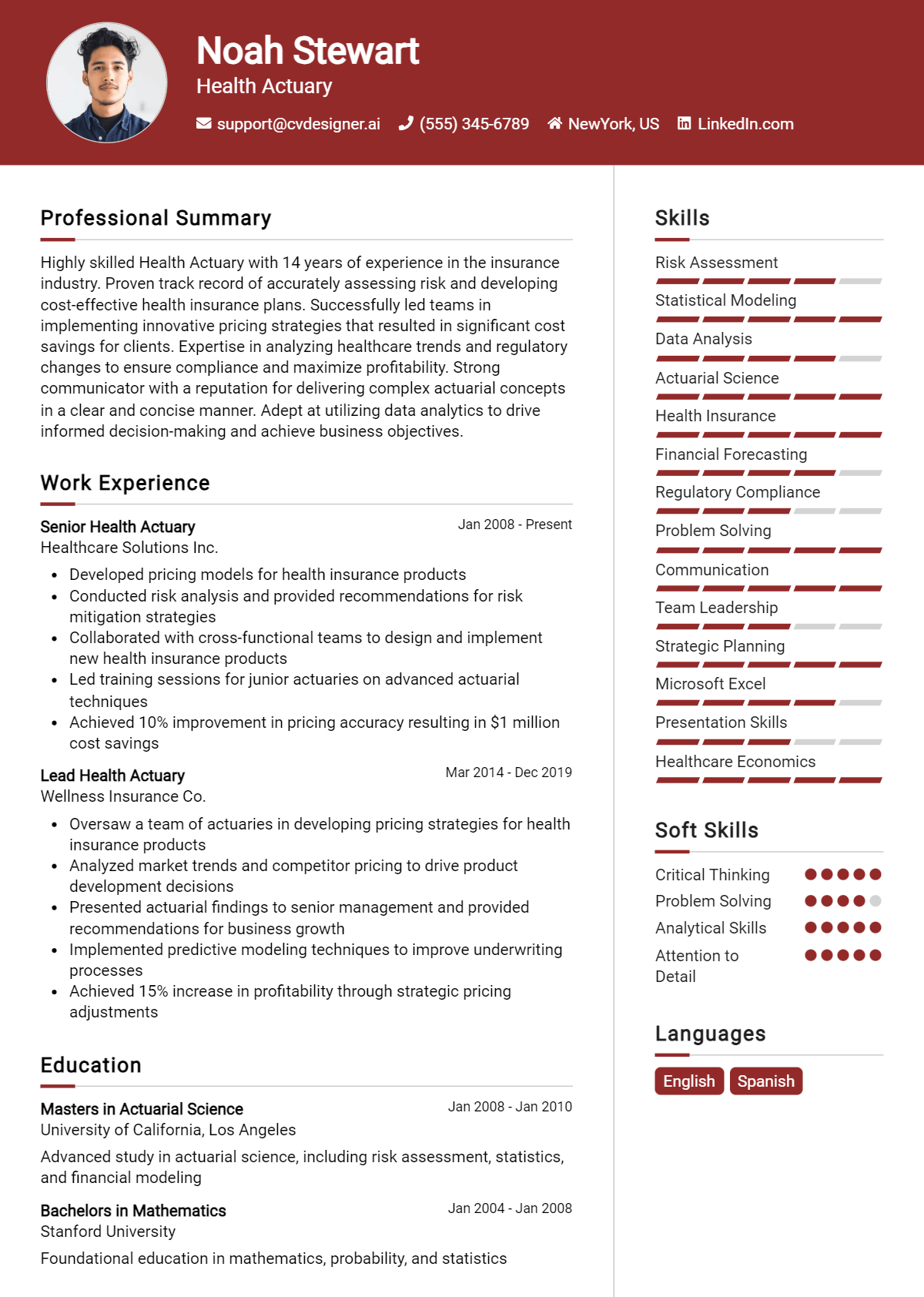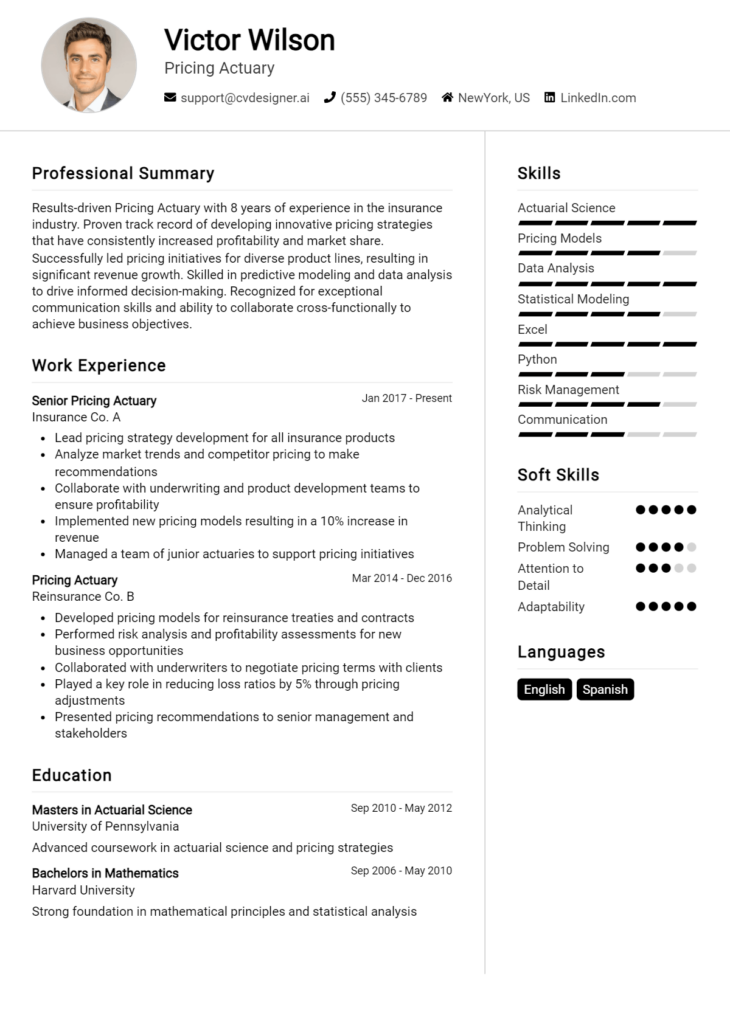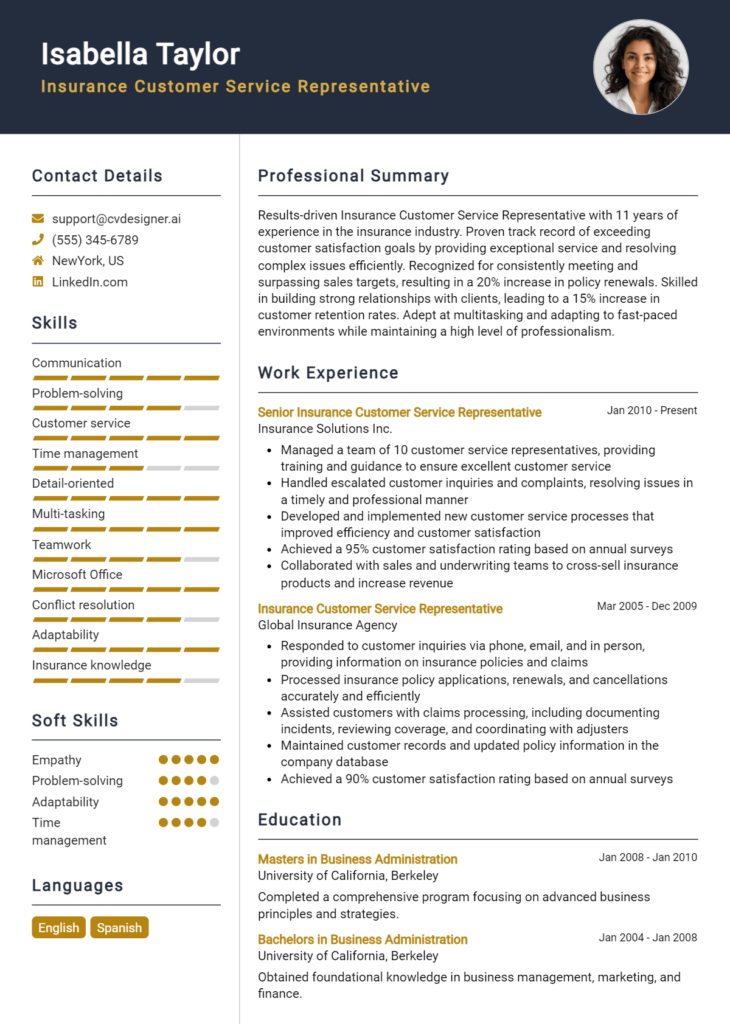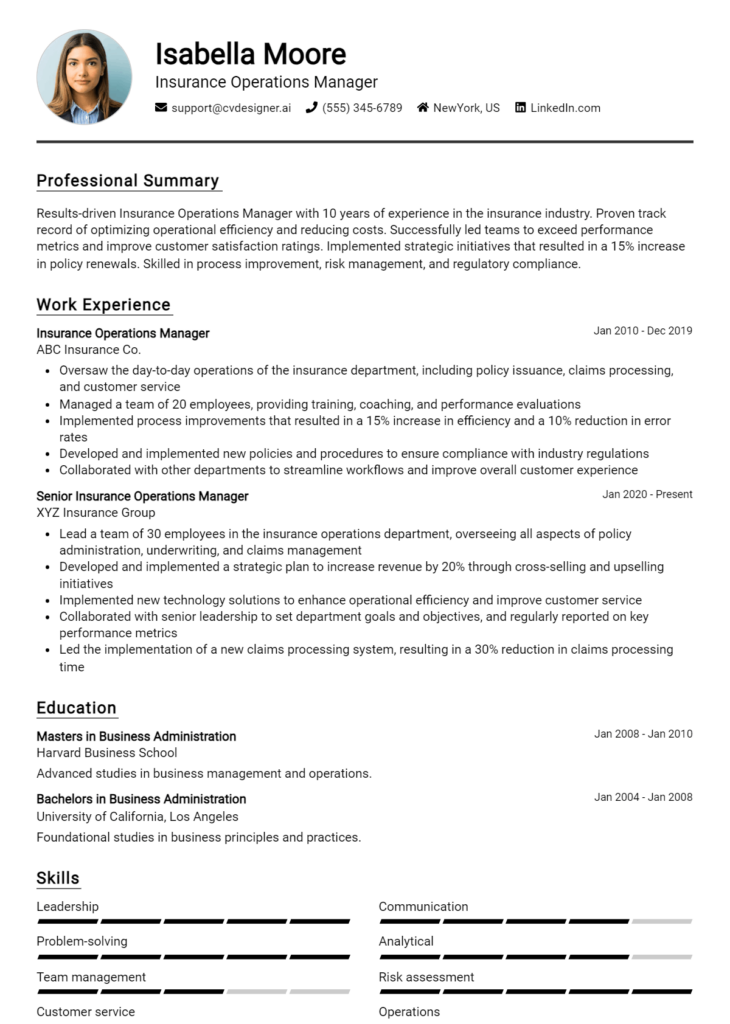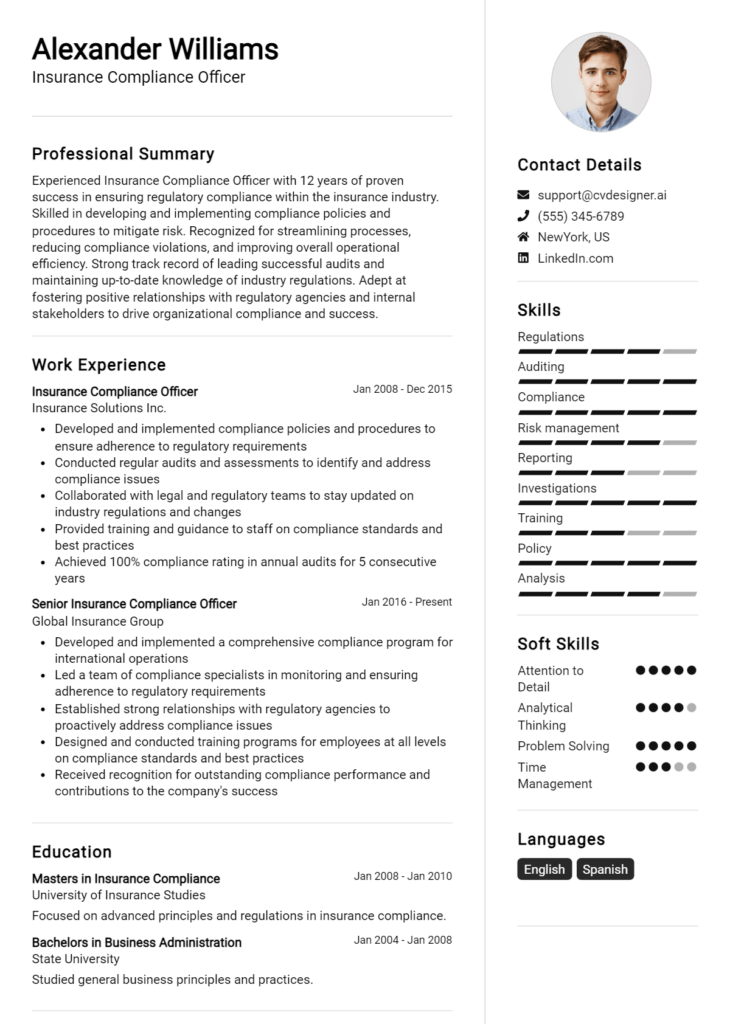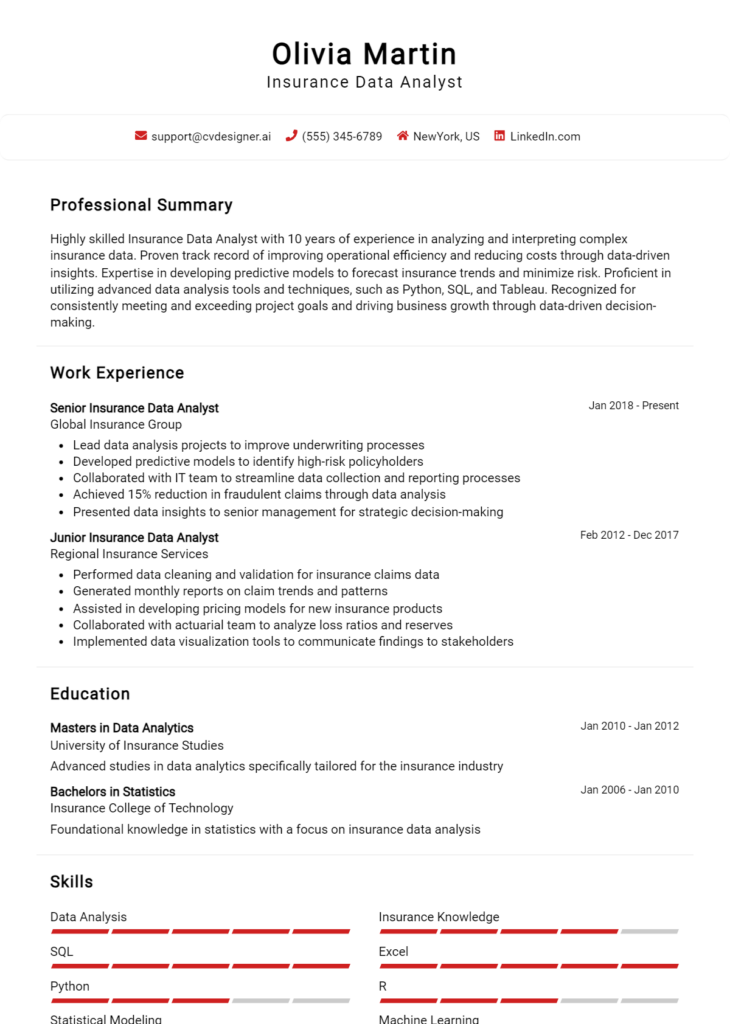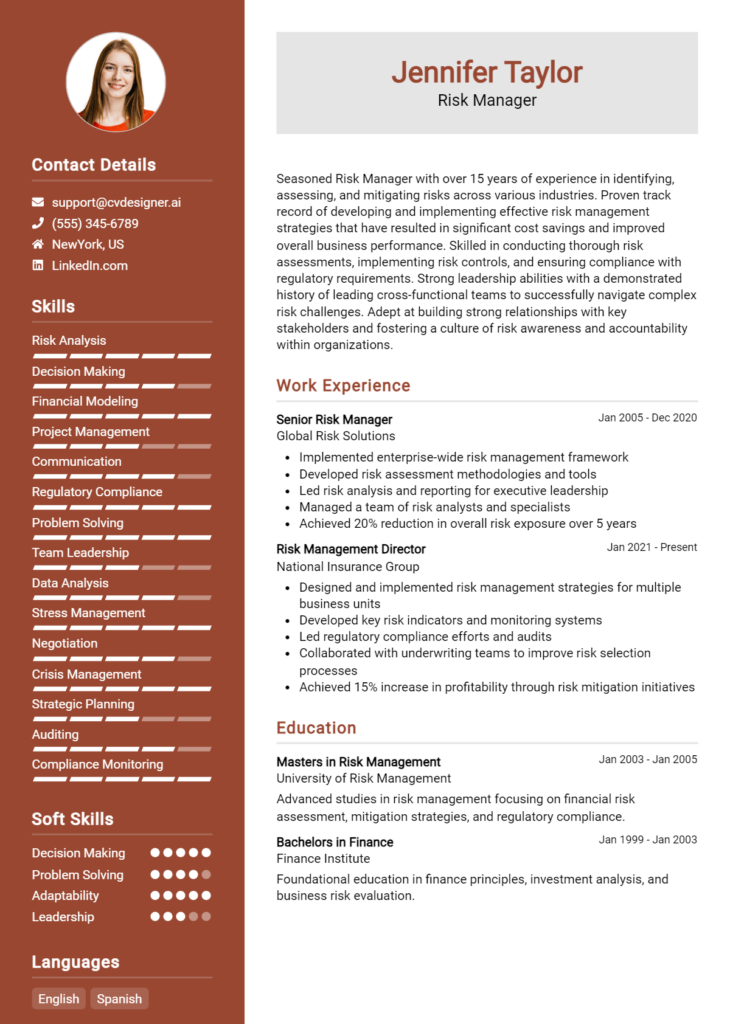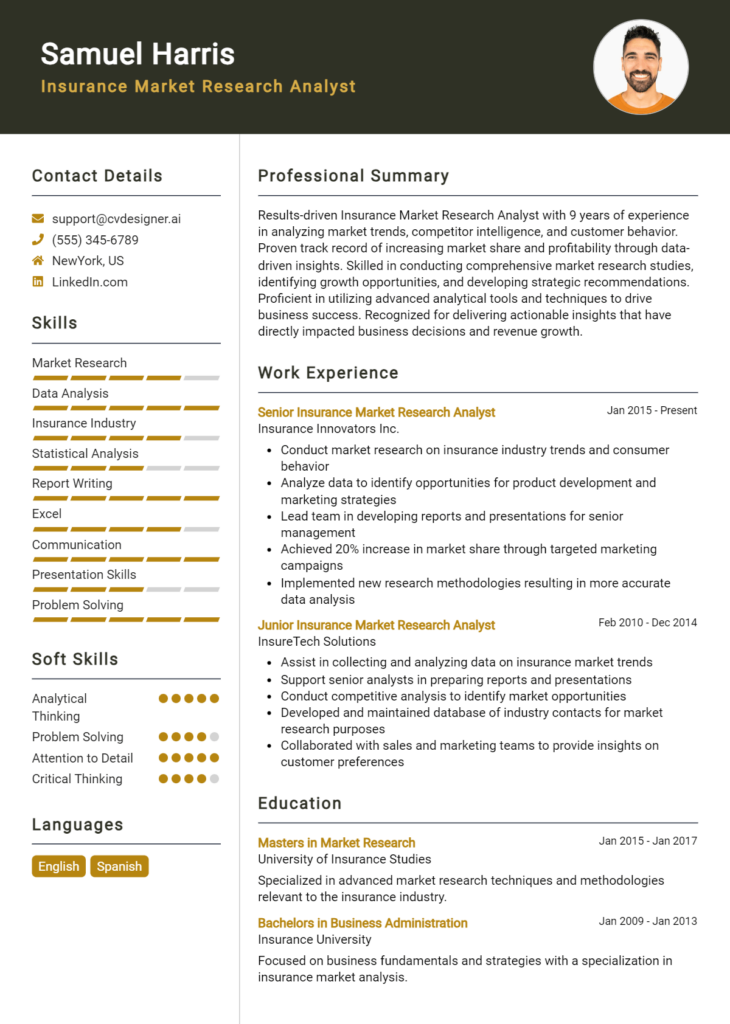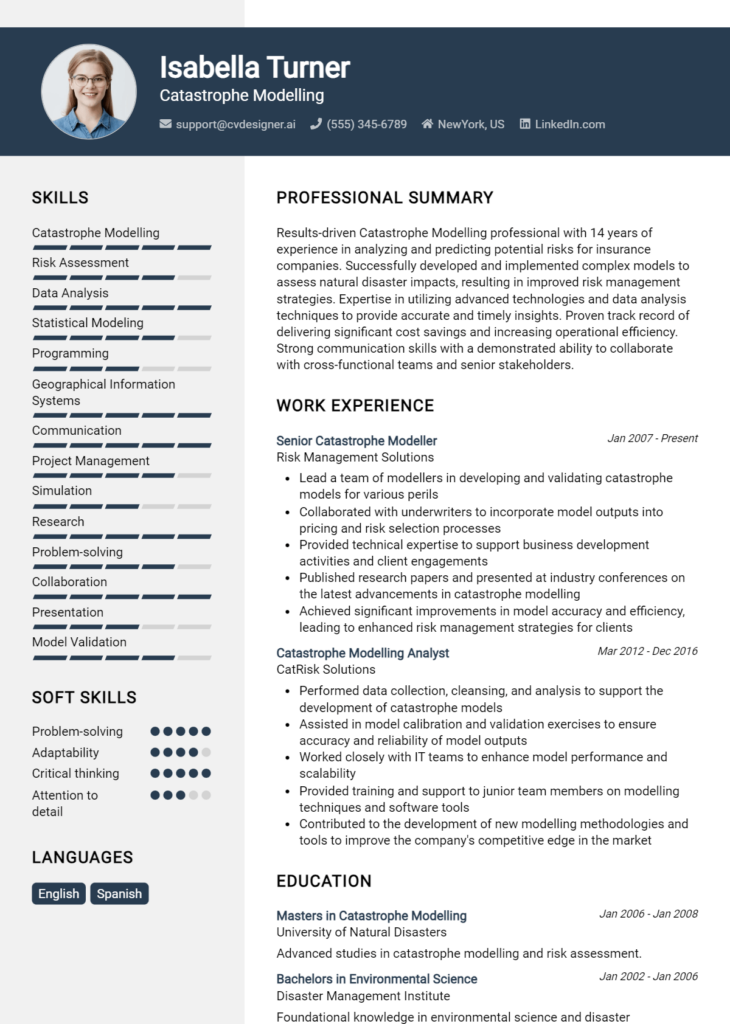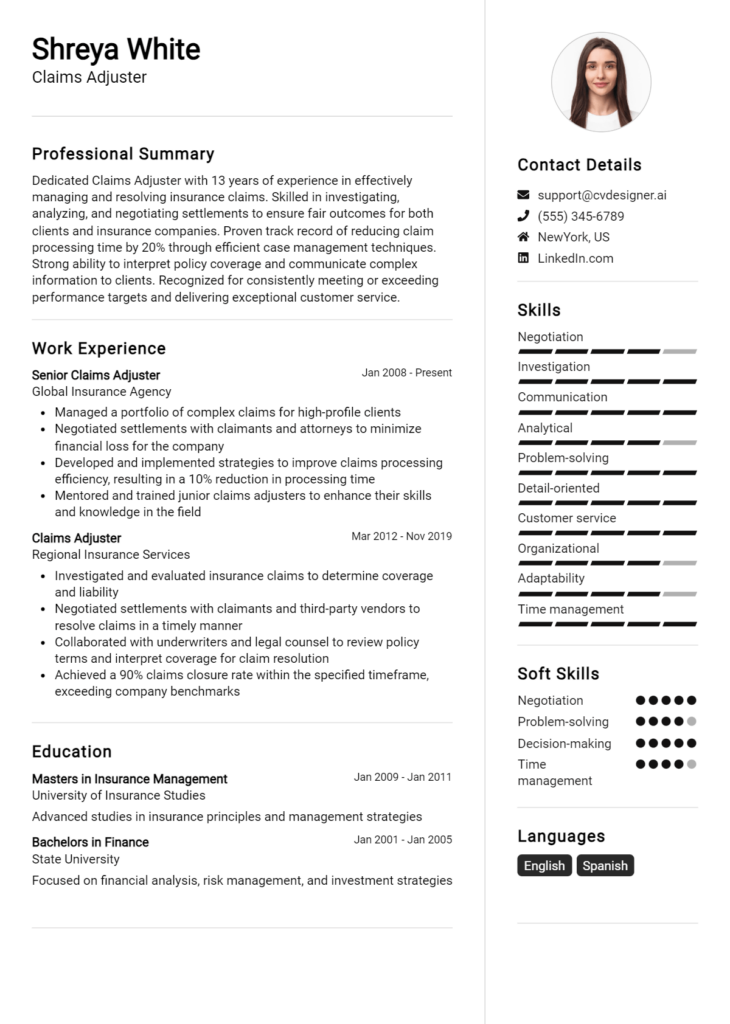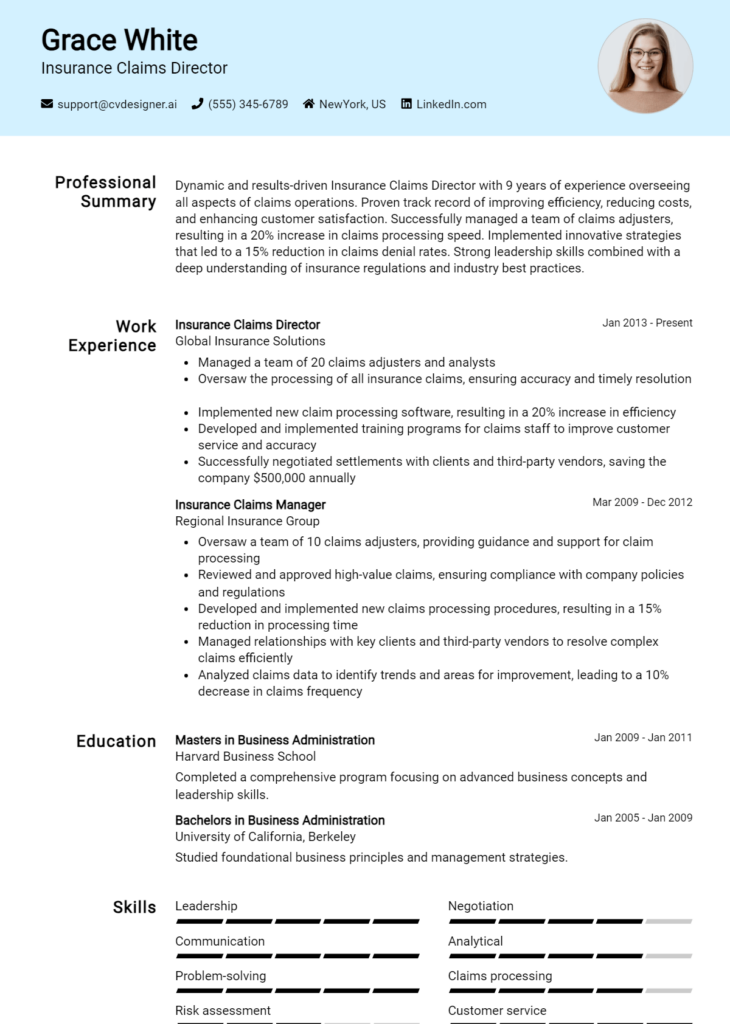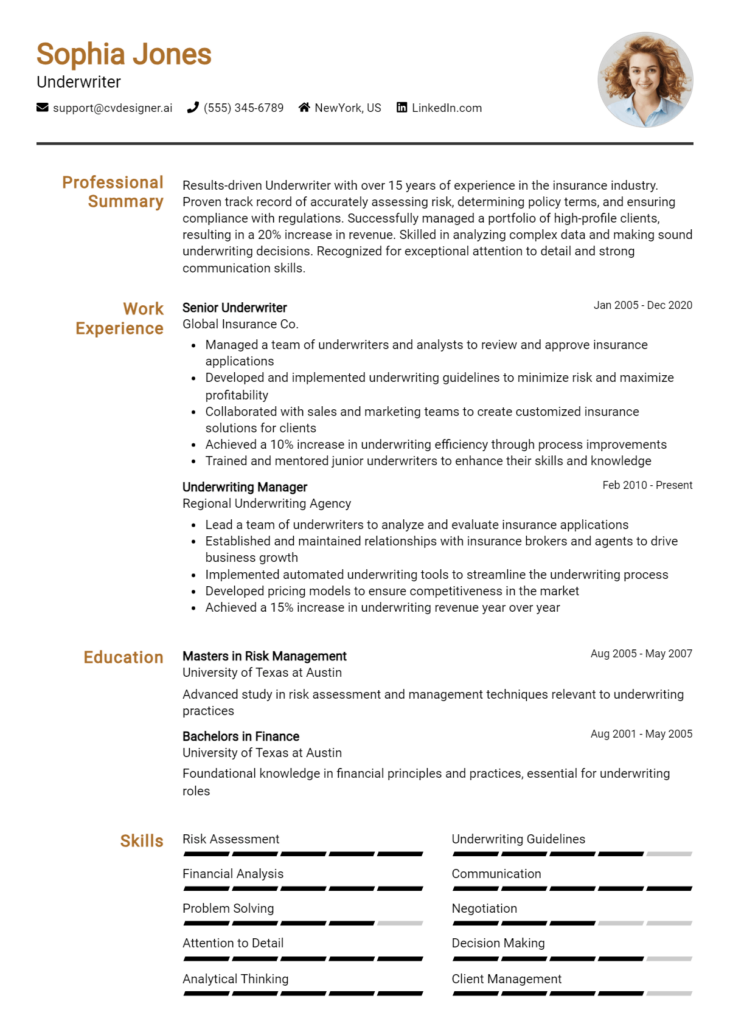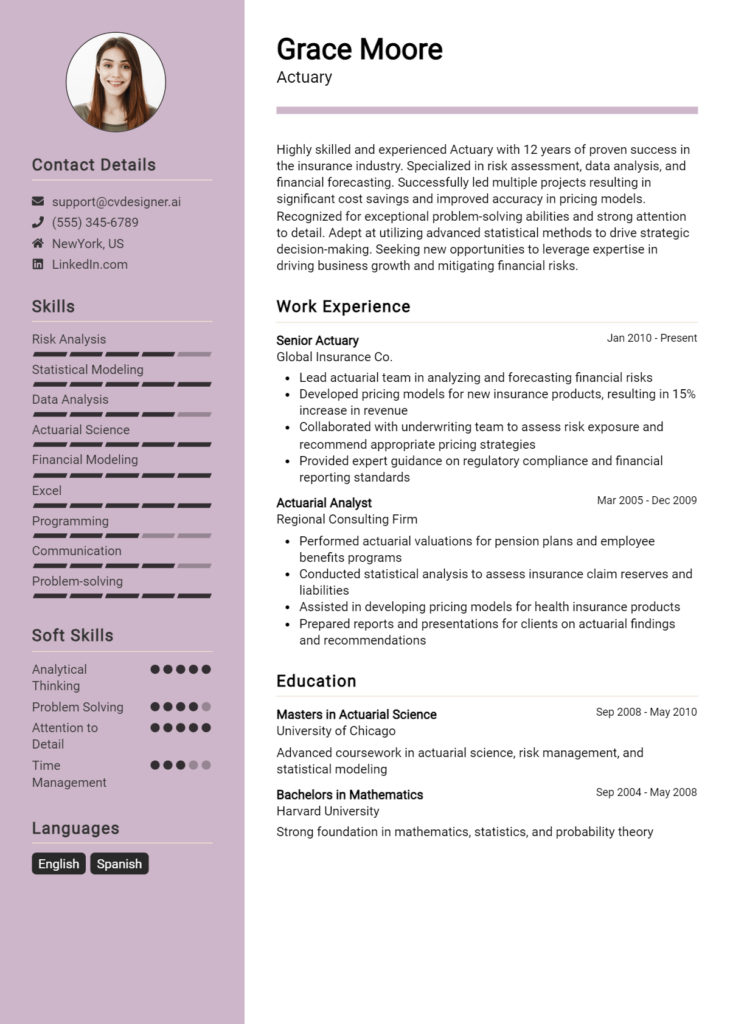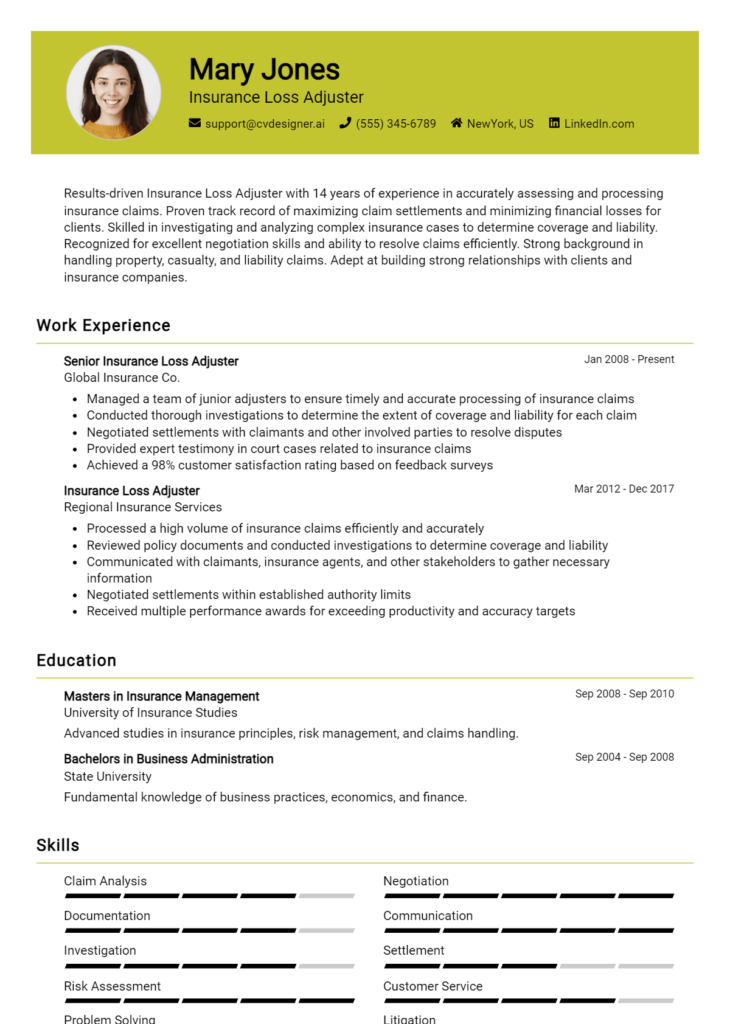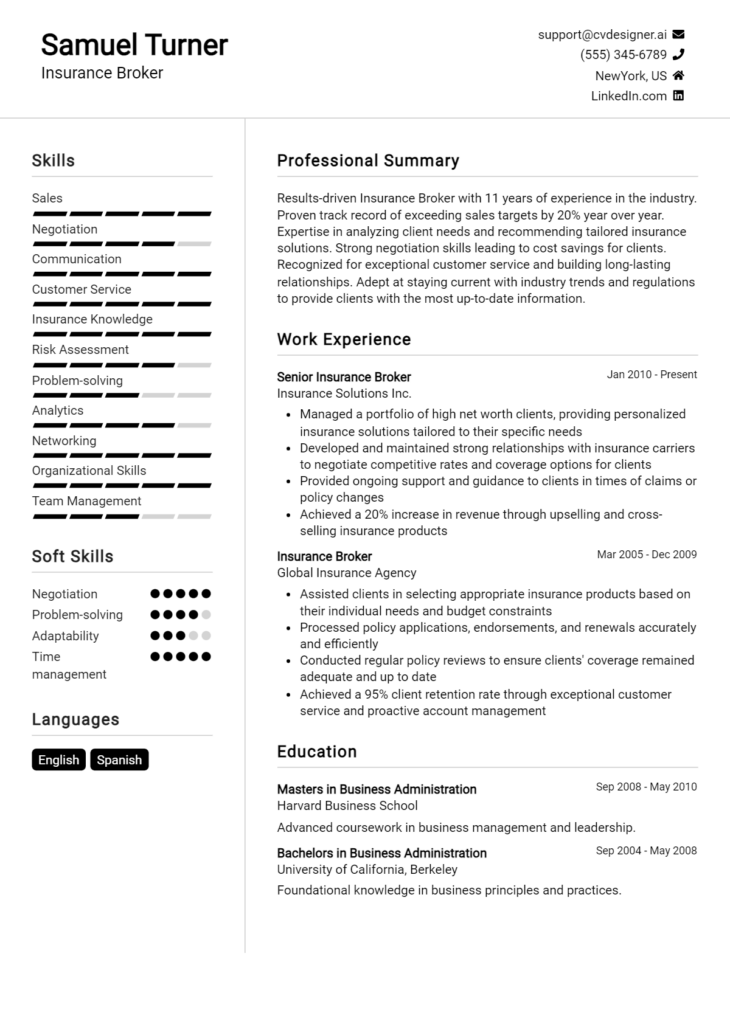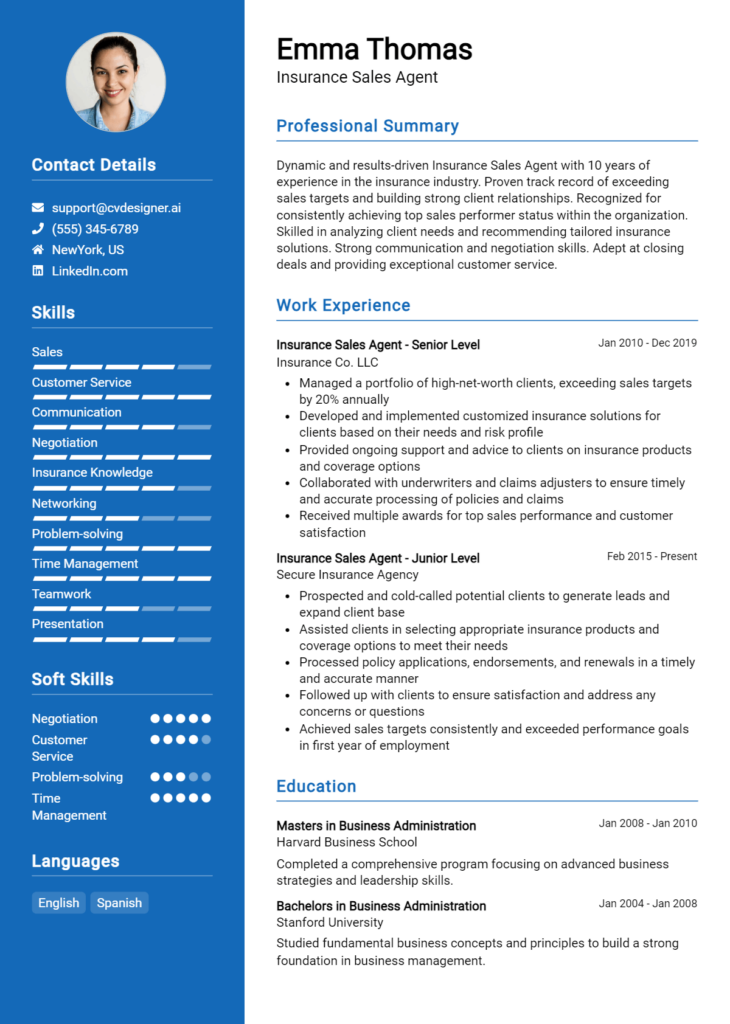Health Actuary Core Responsibilities
A Health Actuary plays a vital role in analyzing data to estimate healthcare costs, risks, and trends, bridging finance, underwriting, and clinical departments. This position requires strong technical skills in statistical analysis and modeling, operational abilities to implement strategies, and problem-solving skills to address complex healthcare challenges. By contributing to informed decision-making, Health Actuaries help align organizational goals with financial sustainability. A well-structured resume can effectively highlight these qualifications, demonstrating a candidate's value to potential employers.
Common Responsibilities Listed on Health Actuary Resume
- Conduct statistical analyses to assess healthcare cost trends and risks.
- Develop and refine predictive models for healthcare utilization and expenses.
- Collaborate with cross-functional teams to enhance healthcare product offerings.
- Prepare detailed reports and presentations for stakeholders and management.
- Evaluate insurance policy performance and recommend adjustments.
- Analyze claims data to identify cost-saving opportunities.
- Ensure compliance with regulatory requirements and industry standards.
- Participate in strategic planning to improve financial outcomes.
- Utilize advanced software tools for data analysis and modeling.
- Monitor economic and healthcare industry trends to inform business strategies.
- Assist in pricing strategies for health insurance products.
High-Level Resume Tips for Health Actuary Professionals
A well-crafted resume is crucial for Health Actuary professionals, as it serves as the first impression a candidate makes on potential employers. In a competitive job market, your resume must not only convey your technical skills and analytical capabilities but also illustrate your achievements and contributions to the health insurance sector. A compelling resume will reflect your unique qualifications and demonstrate how you can add value to an organization. This guide will provide practical and actionable resume tips specifically tailored for Health Actuary professionals, helping you to stand out in the eyes of recruiters and hiring managers.
Top Resume Tips for Health Actuary Professionals
- Tailor your resume to each job description by incorporating relevant keywords and phrases that align with the specific role.
- Showcase your relevant experience in health actuarial work, including internships, projects, or specific roles you’ve held.
- Quantify your achievements by using specific metrics, such as cost savings, revenue growth, or improved accuracy in predictions.
- Highlight industry-specific skills such as proficiency in statistical software, data analysis, and knowledge of healthcare regulations.
- Include certifications and professional designations, such as Fellow of the Society of Actuaries (FSA) or Associate of the Society of Actuaries (ASA).
- Utilize a clear and concise format that enhances readability, with defined sections for education, experience, and skills.
- Incorporate a professional summary at the top of your resume that encapsulates your expertise and career goals.
- Emphasize your ability to communicate complex data insights to non-technical stakeholders, showcasing your communication skills.
- Consider including relevant volunteer work or professional affiliations that demonstrate your commitment to the actuarial profession.
By implementing these tips, you can significantly increase your chances of landing a job in the Health Actuary field. A well-structured and tailored resume will not only highlight your qualifications but also resonate with employers looking for candidates who can navigate the complexities of health analytics and insurance solutions. Take the time to refine your resume, and you’ll be one step closer to achieving your career goals.
Why Resume Headlines & Titles are Important for Health Actuary
In the competitive field of health actuarial science, a well-crafted resume headline or title serves as a critical first impression that can set the tone for the entire application. A strong headline not only grabs the attention of hiring managers but also succinctly summarizes a candidate's key qualifications and strengths in one impactful phrase. Given the analytical and detail-oriented nature of the health actuary role, it is essential for the headline to be concise, relevant, and directly tied to the specific job being applied for. This enables candidates to quickly convey their expertise and align their skills with the needs of potential employers.
Best Practices for Crafting Resume Headlines for Health Actuary
- Keep it concise—aim for one impactful phrase that captures your essence.
- Use specific terms relevant to the health actuary field, such as "Risk Assessment" or "Healthcare Analytics."
- Highlight your most significant skills or accomplishments to stand out.
- Tailor the headline to align with the job description and requirements.
- Incorporate industry keywords to enhance visibility in applicant tracking systems.
- Avoid vague language; be precise about your expertise and experience.
- Consider including quantifiable achievements to demonstrate your impact.
- Stay professional and avoid overly casual or creative language that may detract from your qualifications.
Example Resume Headlines for Health Actuary
Strong Resume Headlines
"Experienced Health Actuary Specializing in Predictive Analytics and Risk Management"
“Detail-Oriented Health Actuary with 5+ Years in Healthcare Cost Forecasting”
"Certified Health Actuary with Proven Track Record in Data-Driven Decision Making"
"Dynamic Health Actuary Focused on Innovative Solutions for Risk Assessment"
Weak Resume Headlines
“Actuary”
“Looking for an Actuary Position”
The strong headlines are effective because they directly communicate relevant skills, experiences, and areas of expertise that are crucial for a health actuary role. They catch the eye of hiring managers by providing specific information about what the candidate brings to the table. In contrast, the weak headlines fail to impress due to their vagueness and lack of focus, leaving hiring managers with no clear understanding of the candidate’s qualifications or value proposition. This can diminish the chances of making a positive impression in a competitive job market.
Writing an Exceptional Health Actuary Resume Summary
A well-crafted resume summary for a Health Actuary is crucial for making a strong first impression on hiring managers. This brief yet impactful section serves as an elevator pitch, succinctly highlighting key skills, relevant experience, and notable accomplishments that align with the job role. A compelling summary not only grabs attention but also sets the tone for the rest of the resume, demonstrating the candidate's suitability for the position. It should be concise, impactful, and tailored specifically to the job description, ensuring that it resonates with the needs of potential employers.
Best Practices for Writing a Health Actuary Resume Summary
- Quantify achievements: Use numbers and metrics to demonstrate your impact, such as improved risk assessment accuracy or cost savings.
- Focus on relevant skills: Highlight technical skills, analytical abilities, and knowledge of health regulations and policies pertinent to the role.
- Tailor the summary: Customize your summary for each job application to reflect the specific requirements and priorities of the position.
- Use action verbs: Start sentences with strong action verbs to convey confidence and proactivity.
- Keep it concise: Aim for 3-5 sentences that deliver the most critical information without overwhelming the reader.
- Incorporate industry keywords: Use terminology from the job description to ensure your summary aligns with what employers are seeking.
- Showcase problem-solving abilities: Emphasize your capacity to address complex issues and provide solutions in health actuary contexts.
- Include professional designations: Mention relevant certifications such as Fellow of the Society of Actuaries (FSA) or Associate of the Society of Actuaries (ASA) if applicable.
Example Health Actuary Resume Summaries
Strong Resume Summaries
Detail-oriented Health Actuary with over 7 years of experience in analyzing healthcare data to optimize insurance pricing strategies. Successfully developed a predictive model that reduced risk assessment errors by 25%, resulting in an annual savings of $1.2 million for the organization.
Results-driven Health Actuary proficient in statistical analysis and risk modeling, with a proven track record of enhancing policy performance. Led a project that increased the accuracy of claims forecasting by 30%, directly contributing to a 15% reduction in customer complaints.
Dedicated Health Actuary with expertise in regulatory compliance and healthcare analytics. Recognized for implementing innovative data solutions that improved reporting efficiency by 40%, facilitating timely decision-making for stakeholders.
Weak Resume Summaries
Actuary with experience in health-related tasks and some skills in analysis. Looking to find a position in a health-focused company.
Health Actuary with a background in statistics and general knowledge of the healthcare industry. Interested in a job that allows for growth and development.
The strong resume summaries stand out because they are specific, highlight quantifiable achievements, and demonstrate the candidate's direct relevance to the Health Actuary role. They provide concrete examples of past successes and the skills that make the candidate a strong fit for the position. In contrast, the weak summaries are vague, generic, and lack measurable outcomes, failing to convey the candidate's true value to potential employers.
Work Experience Section for Health Actuary Resume
The work experience section of a Health Actuary resume is a critical component that provides potential employers with insight into a candidate's technical skills, leadership abilities, and capacity to deliver high-quality products. This section not only highlights the specific roles and responsibilities undertaken by the candidate but also showcases their achievements in quantifiable terms, demonstrating their contributions to the organization and the industry. Aligning work experience with industry standards is crucial, as it helps to portray the candidate as a knowledgeable professional equipped to tackle the challenges faced in the health actuarial field.
Best Practices for Health Actuary Work Experience
- Emphasize relevant technical skills such as statistical analysis, predictive modeling, and risk assessment.
- Quantify achievements with specific metrics, such as cost savings or improvements in accuracy.
- Highlight leadership roles and team management experience to showcase collaboration skills.
- Use industry-specific terminology to align with employer expectations and standards.
- Focus on results-oriented statements that demonstrate the impact of your work on the organization.
- Include relevant certifications or continuing education to illustrate commitment to professional growth.
- Tailor your experience to the specific job description to enhance relevance.
- Showcase projects that involved cross-functional collaboration to highlight teamwork capabilities.
Example Work Experiences for Health Actuary
Strong Experiences
- Led a team of actuaries in developing a predictive model that reduced claim costs by 15%, resulting in annual savings of $1.2 million for the organization.
- Implemented a new data analysis tool that increased the accuracy of risk assessments by 25%, significantly improving underwriting decisions.
- Collaborated with cross-functional teams to design a health insurance product that resulted in a 30% increase in market share within one year.
- Managed a project that streamlined the actuarial reporting process, reducing turnaround time by 40% and enhancing stakeholder satisfaction.
Weak Experiences
- Assisted in various actuarial tasks without specifying contributions or outcomes.
- Worked on projects that involved data analysis but did not detail the impact or results of the work.
- Participated in team meetings and discussions without highlighting leadership or specific contributions.
- Handled routine tasks related to actuarial work without emphasizing any quantifiable achievements.
The examples of strong experiences are considered effective because they provide clear, quantifiable outcomes and demonstrate both technical expertise and leadership capabilities. In contrast, the weak experiences lack specificity and measurable results, making it difficult for potential employers to gauge the candidate's true impact and value in previous roles. By focusing on tangible achievements and collaborative efforts, candidates can better position themselves as qualified professionals in the competitive field of health actuarial science.
Education and Certifications Section for Health Actuary Resume
The education and certifications section of a Health Actuary resume is crucial in demonstrating a candidate's academic foundation and professional qualifications in a complex and competitive field. This section not only showcases the candidate's educational achievements but also highlights any industry-relevant certifications and ongoing learning endeavors. By detailing relevant coursework, certifications, and specialized training, candidates can significantly enhance their credibility and underscore their commitment to staying updated with industry standards and practices. This alignment with the job role is essential for employers looking for qualified professionals who can navigate the intricacies of health actuarial science.
Best Practices for Health Actuary Education and Certifications
- Prioritize relevant degrees such as a Bachelor's or Master's in Actuarial Science, Mathematics, Statistics, or Finance.
- Include recognized certifications such as Associate of the Society of Actuaries (ASA) or Fellow of the Society of Actuaries (FSA).
- List any specialized training or workshops attended that are pertinent to health care or actuarial practices.
- Detail relevant coursework that showcases expertise in health economics, risk management, or predictive modeling.
- Highlight ongoing education efforts, such as professional development courses or continuing education credits.
- Be specific about certification dates and the organizations that issued them to enhance credibility.
- Include any memberships in professional actuarial organizations that demonstrate commitment to the field.
- Use clear and concise formatting to ensure easy readability and quick access to important information.
Example Education and Certifications for Health Actuary
Strong Examples
- Bachelor of Science in Actuarial Science, University of XYZ, 2018
- Associate of the Society of Actuaries (ASA), 2020
- Master's Degree in Health Economics, University of ABC, 2021
- Certification in Predictive Analytics, Professional Development Institute, 2022
Weak Examples
- Bachelor of Arts in History, University of DEF, 2015
- Certification in Basic Computer Skills, 2019
- High School Diploma, Anytown High School, 2012
- Outdated certification in Insurance Underwriting, 2016
The strong examples are considered effective because they directly relate to the qualifications necessary for a Health Actuary role, demonstrating both relevant educational backgrounds and industry-recognized certifications. In contrast, the weak examples highlight irrelevant or outdated qualifications that do not align with the requirements of the position, which could undermine a candidate's potential and credibility in this specialized field.
Top Skills & Keywords for Health Actuary Resume
As a Health Actuary, possessing a diverse set of skills is crucial for effectively analyzing and interpreting data related to health insurance and healthcare costs. A well-crafted resume that highlights both hard and soft skills can significantly enhance a candidate's chances of standing out in a competitive job market. Hard skills demonstrate the technical proficiency required for the role, while soft skills reflect the interpersonal abilities that facilitate collaboration and communication within a team. By focusing on these essential skills, applicants can create a compelling narrative that showcases their capabilities and readiness to contribute to the health insurance industry.
Top Hard & Soft Skills for Health Actuary
Hard Skills
- Proficiency in statistical software (e.g., SAS, R, or Python)
- Knowledge of health insurance regulations and compliance
- Experience with predictive modeling and risk assessment
- Strong understanding of actuarial principles and methodologies
- Ability to analyze large datasets and generate reports
- Expertise in financial forecasting and budgeting
- Familiarity with medical coding and billing
- Proficient in Excel and data visualization tools
- Knowledge of healthcare economics and trends
- Competence in using actuarial software (e.g., Prophet or Milliman)
Soft Skills
- Strong analytical and problem-solving abilities
- Excellent communication and presentation skills
- Ability to work collaboratively in a team environment
- Detail-oriented with strong organizational skills
- Adaptability to changing situations and regulations
- Critical thinking and decision-making capabilities
- Time management skills to handle multiple projects
- Ability to translate complex data into understandable insights
- Strong interpersonal skills to build relationships with stakeholders
- Proven ability to work under pressure and meet deadlines
For more information on essential skills and how to effectively showcase your work experience, consider tailoring your resume to reflect the demands of the Health Actuary role.
Stand Out with a Winning Health Actuary Cover Letter
I am writing to express my interest in the Health Actuary position at [Company Name]. With a strong background in actuarial science and a passion for healthcare analytics, I am excited about the opportunity to contribute to your team. My experience in evaluating health insurance plans, analyzing data trends, and developing predictive models has equipped me with the skills necessary to drive informed decision-making and support strategic initiatives in a dynamic healthcare environment.
In my previous role at [Previous Company Name], I successfully led projects that involved the assessment of risk factors and the development of pricing strategies for various health plans. By utilizing advanced statistical methods and software tools, I was able to identify key trends in patient demographics and healthcare utilization, which resulted in a 15% reduction in claims costs over two years. My ability to communicate complex actuarial concepts to non-technical stakeholders has been instrumental in fostering collaboration across departments and ensuring alignment on organizational goals.
I am particularly drawn to [Company Name] because of your commitment to innovative healthcare solutions and the emphasis placed on data-driven strategies. I am eager to bring my expertise in health risk assessment, regulatory compliance, and financial forecasting to your organization. I am confident that my analytical skills, combined with my dedication to improving healthcare outcomes, would make a valuable addition to your team.
Thank you for considering my application. I look forward to the opportunity to discuss how my experience and vision align with the goals of [Company Name]. I am excited about the possibility of contributing to your mission of transforming healthcare through data analytics and actuarial science.
Common Mistakes to Avoid in a Health Actuary Resume
When applying for a position as a health actuary, crafting a compelling resume is crucial to stand out in a competitive job market. However, many candidates make common mistakes that can undermine their chances of landing an interview. Understanding these pitfalls can help you present a polished and effective resume that highlights your qualifications and expertise in the field of health actuarial science.
Neglecting Relevant Experience: Failing to prominently feature experience specifically related to health actuarial work can lead to a resume that seems generic. Ensure your relevant roles and responsibilities are clearly highlighted.
Overly Technical Language: Using jargon or overly technical terms without context may alienate hiring managers who may not share the same level of expertise. Strive for clarity and make your achievements understandable to a broader audience.
Lack of Quantifiable Achievements: Listing duties instead of accomplishments doesn’t effectively showcase your impact. Always include specific metrics or outcomes that demonstrate your contributions, such as cost savings or improved efficiencies.
Ignoring Keywords: Many companies use Applicant Tracking Systems (ATS) to screen resumes. Failing to include industry-relevant keywords from the job description can result in your resume being overlooked, so tailor your application to each position.
Inconsistent Formatting: A cluttered or inconsistent format can distract from the content of your resume. Aim for a professional appearance with uniform fonts, bullet points, and spacing to ensure readability.
Omitting Continuing Education: The field of health actuarial science is constantly evolving. Not mentioning any relevant certifications, courses, or ongoing education can give the impression that you’re not committed to professional growth.
Excessive Length: A resume that exceeds two pages may lose the interest of hiring managers. Focus on conciseness and clarity, ensuring you include only the most relevant information.
Failing to Tailor Each Resume: Sending out the same resume for multiple applications can be detrimental. Customizing your resume for each job, emphasizing the skills and experiences relevant to the specific position, shows attention to detail and genuine interest.
Conclusion
As we have explored, the role of a Health Actuary is critical in navigating the complexities of healthcare systems and insurance markets. Actuaries utilize their advanced analytical skills to assess risks, evaluate health trends, and develop strategies that can significantly impact healthcare costs and outcomes. With the increasing demand for healthcare services and the ever-evolving landscape, the need for skilled actuaries is more pronounced than ever.
To stand out in this competitive field, it's essential to have a well-crafted resume that showcases your unique skills and experiences. A strong resume not only highlights your technical abilities but also conveys your understanding of healthcare dynamics and your capacity to contribute to an organization's success.
Now is the perfect time to review and enhance your Health Actuary resume. Take advantage of the wide array of resources available to you. Explore resume templates to find a layout that resonates with your professional style. Use the resume builder to create a polished and tailored resume that effectively markets your qualifications. For inspiration, check out resume examples that can guide you in crafting compelling content. Additionally, consider having a strong introduction with a cover letter template that complements your resume.
Don't wait—take the proactive step today to refine your application materials and present yourself as the ideal candidate for the Health Actuary role you aspire to. Your future in this rewarding field starts with a standout resume!

